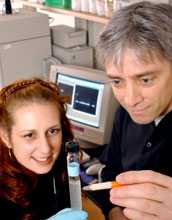Multimedia Gallery
Microorganisms may improve bioremediation process
Assistant professor Frank Löffler and postdoctoral fellow Kirsti Ritalahti of the Georgia Institute of Technology examine unusual, strictly anaerobic bacteria (bacteria capable of living in the absence of free oxygen) that were isolated from freshwater river sediments and marine fish intestines. Löffler and his research team believe these microorganisms may be used in the future to clean up certain polluted environments, thereby improving the present bioremediation process.
This research is supported by a National Science Foundation Faculty Early Career Development (CAREER) award (IOS 00-90496, awarded to Dr. F. E. Löffler. (Year of image: 2003)
Credit: Georgia Institute of Technology; photo by Gary Meek
Images and other media in the National Science Foundation Multimedia Gallery are available for use in print and electronic material by NSF employees, members of the media, university staff, teachers and the general public. All media in the gallery are intended for personal, educational and nonprofit/non-commercial use only.
Images credited to the National Science Foundation, a federal agency, are in the public domain. The images were created by employees of the United States Government as part of their official duties or prepared by contractors as "works for hire" for NSF. You may freely use NSF-credited images and, at your discretion, credit NSF with a "Courtesy: National Science Foundation" notation.
Additional information about general usage can be found in Conditions.
Also Available:
Download the high-resolution JPG version of the image. (1.3 MB)
Use your mouse to right-click (Mac users may need to Ctrl-click) the link above and choose the option that will save the file or target to your computer.



